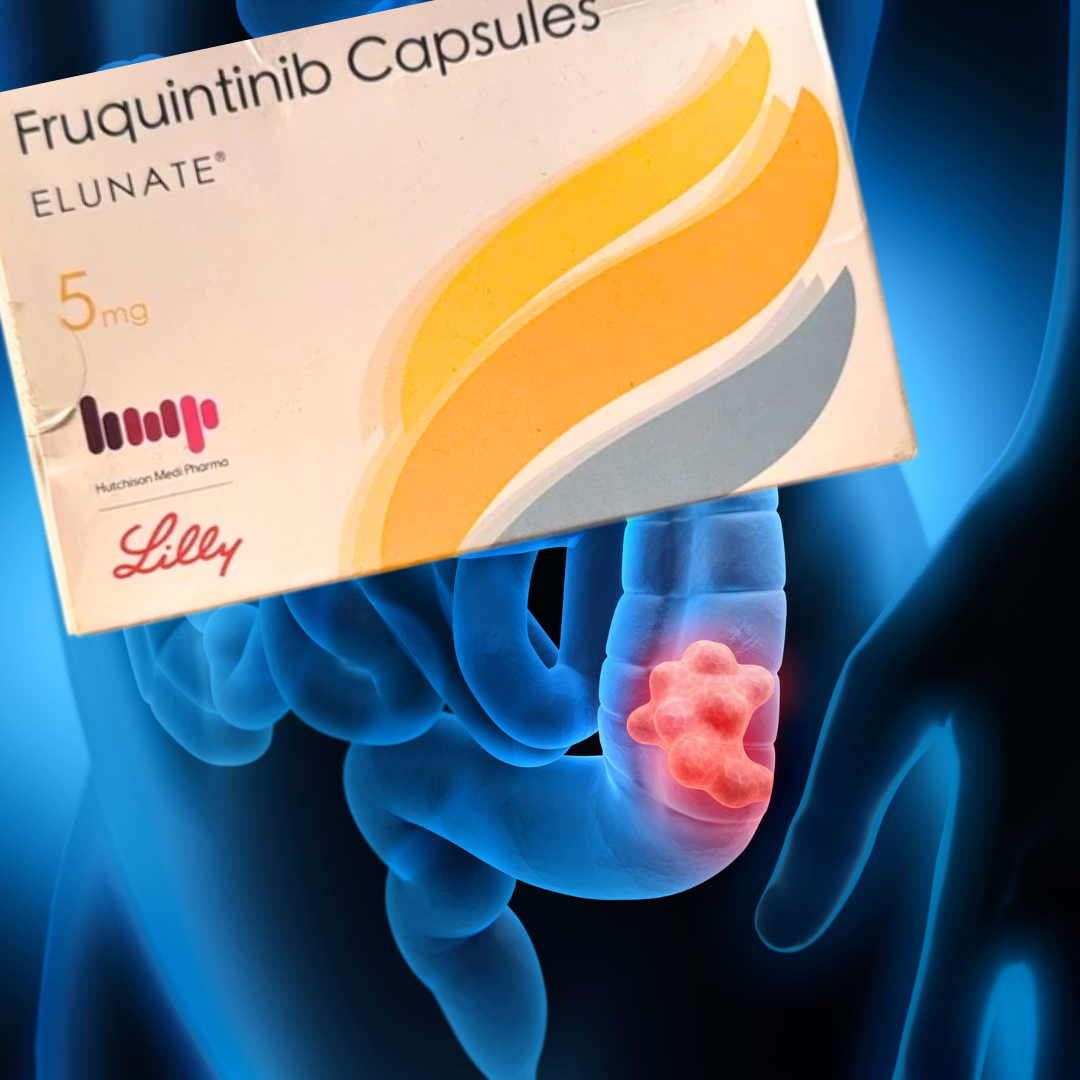Introduction
Colorectal cancer remains one of the leading causes of cancer-related deaths worldwide. For patients with advanced stages of the disease—particularly those who have exhausted first-line and second-line treatment options—new therapies offer a potential extension of life and symptom control. One such targeted therapy is Elunate, which contains the active pharmaceutical ingredient fruquintinib.
What is Elunate?
Elunate is an oral medication classified as a VEGFR tyrosine kinase inhibitor (TKI). It works by targeting the vascular endothelial growth factor receptors (VEGFR 1, 2, and 3), which are involved in the formation of blood vessels (angiogenesis) that tumors need to grow and metastasize.
By inhibiting these receptors, fruquintinib helps limit the tumor’s ability to create new blood vessels, essentially starving the cancer cells of the nutrients and oxygen they need.
Medical Use
Elunate is primarily indicated for the treatment of metastatic colorectal cancer (mCRC) in patients who have already undergone standard chemotherapy regimens, including:
-
Fluoropyrimidine-based therapies
-
Oxaliplatin
-
Irinotecan
It may also be used in patients who have previously received therapies targeting VEGF or EGFR, depending on clinical suitability.
Mechanism of Action
Fruquintinib, the active ingredient in Elunate, binds selectively to VEGFR-1, VEGFR-2, and VEGFR-3. These receptors play a crucial role in angiogenesis, a process essential for tumor survival and spread. By blocking this pathway:
-
Tumor blood supply is reduced
-
Tumor growth is slowed or halted
-
Metastatic potential is diminished
This mechanism classifies Elunate as a targeted anti-angiogenic agent, which differs from traditional chemotherapy that indiscriminately affects rapidly dividing cells.
Dosage and Administration
Elunate is typically administered in 28-day cycles, consisting of:
-
21 days of treatment
-
7 days of rest
The standard dose is 5 mg taken once daily, though this may be adjusted based on individual tolerance, liver function, or treatment response. The tablets are taken orally with water and can be administered with or without food.
Clinical Evidence
Several clinical trials have supported the efficacy and safety of fruquintinib:
-
The FRESCO trial (conducted in China) demonstrated a significant improvement in overall survival (OS) and progression-free survival (PFS) in patients with mCRC.
-
The FRESCO-2 trial (a global, phase 3 study) confirmed these benefits in a broader patient population, leading to international regulatory approvals.
These trials showed that patients receiving fruquintinib had prolonged survival compared to those receiving placebo, with a manageable side effect profile.
Side Effects and Monitoring
Like all anti-cancer therapies, Elunate may cause adverse effects. Common side effects include:
-
High blood pressure (hypertension)
-
Hand-foot skin reaction
-
Fatigue
-
Loss of appetite
-
Diarrhea
-
Proteinuria (protein in urine)
Patients require regular monitoring of blood pressure, kidney and liver function, and other lab values during treatment.
Contraindications and Precautions
Elunate may not be suitable for everyone. Special caution is advised in:
-
Patients with uncontrolled hypertension
-
Those with bleeding disorders
-
Pregnant or breastfeeding individuals
-
Patients with severe liver or kidney impairment
Drug interactions with strong CYP3A4 inducers/inhibitors should also be considered, as they can alter the effectiveness or toxicity of fruquintinib.
Global Regulatory Status
Fruquintinib was first approved in China in 2018 under the brand name Elunate. In 2023, it was approved by the U.S. FDA under the trade name Fruzaqla for the treatment of refractory metastatic colorectal cancer. The drug has also received approval in regions like Europe and Japan following global clinical trial success.
Conclusion
Elunate represents a significant advancement in the treatment of metastatic colorectal cancer, particularly for patients with limited options after first- and second-line therapies. As a targeted therapy, it offers a more focused mechanism of action with a tolerable safety profile. While it is not curative, Elunate can contribute to better disease control and quality of life in appropriate patients.

